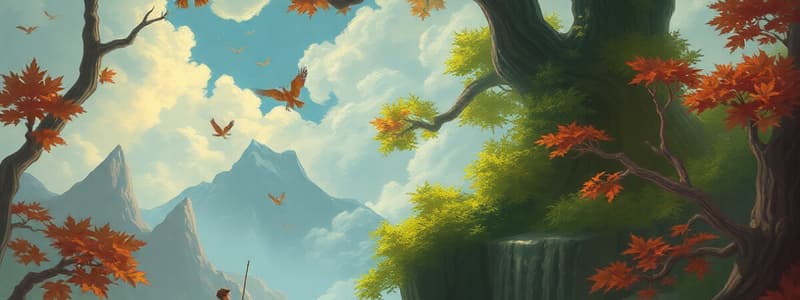Podcast
Questions and Answers
Which characteristic of literature refers to its capacity to continuously offer fresh delight and new insights with each reading?
Which characteristic of literature refers to its capacity to continuously offer fresh delight and new insights with each reading?
- Universality
- Permanence (correct)
- Spiritual Value
- Suggestiveness
A literary work that explores themes of love, loss, and redemption across different cultures and time periods primarily demonstrates which characteristic?
A literary work that explores themes of love, loss, and redemption across different cultures and time periods primarily demonstrates which characteristic?
- Suggestiveness
- Spiritual Value
- Realism
- Universality (correct)
If a piece of literature aims to deeply move the reader and ignite their creative thinking beyond ordinary experiences, which attribute is it primarily utilizing?
If a piece of literature aims to deeply move the reader and ignite their creative thinking beyond ordinary experiences, which attribute is it primarily utilizing?
- Suggestiveness (correct)
- Permanence
- Universality
- Moral Instruction
A play featuring characters engaging in dialogues and designed for stage performance falls under which literary category?
A play featuring characters engaging in dialogues and designed for stage performance falls under which literary category?
What is the primary appeal of prose, which distinguishes it from poetry?
What is the primary appeal of prose, which distinguishes it from poetry?
Which characteristic primarily distinguishes a novel from a short story?
Which characteristic primarily distinguishes a novel from a short story?
A writer is creating an account of their own life experiences, thoughts, and observations recorded daily. Which literary form is the writer most likely creating?
A writer is creating an account of their own life experiences, thoughts, and observations recorded daily. Which literary form is the writer most likely creating?
If a literary work aims to ridicule the vices and follies of men, to which prose form does it belong?
If a literary work aims to ridicule the vices and follies of men, to which prose form does it belong?
A literary critic is analyzing a novel. What best describes the primary goal of their analysis?
A literary critic is analyzing a novel. What best describes the primary goal of their analysis?
Which of the following literary genres includes both short stories and novels?
Which of the following literary genres includes both short stories and novels?
If literature primarily reflects human experiences, which statement best explains its enduring significance?
If literature primarily reflects human experiences, which statement best explains its enduring significance?
A reader engages with a novel and finds that it challenges their previously held beliefs about society. According to the provided text, what is the most likely cause of this?
A reader engages with a novel and finds that it challenges their previously held beliefs about society. According to the provided text, what is the most likely cause of this?
Considering literature's role in appealing to various aspects of human nature, how does it primarily differ from purely informational texts?
Considering literature's role in appealing to various aspects of human nature, how does it primarily differ from purely informational texts?
If a piece of writing solely focuses on factual accuracy without employing figurative language or narrative, can it still be considered literature based on the texts definition?
If a piece of writing solely focuses on factual accuracy without employing figurative language or narrative, can it still be considered literature based on the texts definition?
Why is understanding the historical and cultural context important when assessing the intellectual value of a literary work?
Why is understanding the historical and cultural context important when assessing the intellectual value of a literary work?
Flashcards
Origin of Literature
Origin of Literature
Literature comes from the Latin word meaning letter and the French phrase for beautiful writing.
Broad Definition of Literature
Broad Definition of Literature
Literature encompasses everything that has ever been written.
Understanding Human Nature
Understanding Human Nature
Studying literature helps us fully understand human nature and nations.
Essence of Literature
Essence of Literature
Signup and view all the flashcards
Qualities of Great Literature
Qualities of Great Literature
Signup and view all the flashcards
Suggestiveness
Suggestiveness
Signup and view all the flashcards
Spiritual Value
Spiritual Value
Signup and view all the flashcards
Permanence
Permanence
Signup and view all the flashcards
Universality
Universality
Signup and view all the flashcards
Prose vs. Poetry
Prose vs. Poetry
Signup and view all the flashcards
Novel
Novel
Signup and view all the flashcards
Short Story
Short Story
Signup and view all the flashcards
Biography
Biography
Signup and view all the flashcards
Autobiography
Autobiography
Signup and view all the flashcards
Literary Criticism
Literary Criticism
Signup and view all the flashcards
Study Notes
Introduction to Literature
- Literature encompasses the entirety of written works, including ideas, thoughts, and emotions conveyed by humans.
- The term "litera" originates from the Latin word for "letter", emphasizing the written form.
- Literature is deemed a crucial instrument for comprehending human nature and national identities.
- "Belles lettres," a French phrase, describes beautiful writing, and represents a core component of literature.
Essence and Significance of Literature
- Literature, in its broadest sense, encompasses all written works.
- Literature serves as a vital tool for comprehending human nature and cultures.
- Individuals gain insights into various aspects of life and different societies through engaging with literature.
- Engaging with literature enhances understanding of emotions, thoughts, and insights.
- Literature is an essential tool for conveying cultural and societal insights. Its importance spans various eras.
Qualities of Literature
- Artistry: Literature is aesthetically pleasing and appeals to the sense of beauty.
- Intellectual Value: Literature stimulates thought, enriching mental clarity as it delves into life's fundamental principles and human nature.
- Suggestiveness: Literature has the capacity to evoke strong emotions and inspire imagination, transcending ordinary human experiences.
- Spiritual Value: Literature instills moral values, fostering personal growth and a higher spiritual plane.
- Permanence: Literature endures through time, providing fresh perspectives and experiences with each encounter.
- Universality: Literary value transcends time, exhibiting enduring relevance based on themes and conditions.
Types of Literary Works
- Prose Drama: Dialogue-based plays intended for stage performances, consisting of prose.
- Essays: Brief, expository compositions delving into thoughts, feelings, and observations on various aspects of life.
- Prose Fiction: Invented narratives, stories where characters and events are imagined, although often based on real-life scenarios or experiences.
- Novels: Lengthy fictional narratives, encompassing intricate plots, subplots, characters, and actions mirroring real-life situations, often involving past or present times.
- Short Stories: Concise fictional narratives focusing on a single character, event, or situation, often described as a "slice of life."
- Biographies: Written accounts of a person's life, compiled by someone else who has sufficient knowledge of the person.
- Autobiographies: Written accounts of one’s own life.
- Diaries: Daily records of personal experiences, thoughts, activities, and observations.
- Journals: Periodicals or magazines, typically characterized by a serious or scholarly nature.
- Other Prose Forms:
- Historical Prose: Literary works based on historical events.
- Scientific Prose: Prose works revolving around scientific themes.
- Satirical Prose: Prose that critiques societal flaws or human folly. Current Publications that are commonly known or accepted, such as books, magazines, and newspapers. Literary Criticism is the analysis, interpretation, and evaluation of literary works. Book Reviews are articles that assess the content, worth, and other aspects of books, often focusing on a recent release.
Literary Genres
- Fiction: Imaginative representation of life, often found in short stories and novels.
- Poetry: Expressive writing using aesthetic elements like meter, rhyme, and figurative language.
- Essays: Compositions reflecting on various topics through personal insights and perspectives.
- Drama: Plays intended primarily for stage performance, using dialogue to advance plots.
Elements of Fiction
- Characters: Representations of human beings within a story. Methods of character revelation include actions, descriptions, dialogue, and commentary by other characters, or by the author.
- Round Characters: Complex and dynamic, exhibiting a multifaceted nature and adapting to circumstances.
- Flat Characters: Less complex, and less dynamic, often representing a single trait.
- Setting: Time and location of the events in a story, where it takes place. This provides context for characters and actions.
- Conflict: The struggle or opposition between characters or forces that drives the plot. This can be internal (character vs. self), interpersonal (character vs. character), or external (character vs. society, nature, destiny).
- Plot: Sequence of events in a story, from the beginning to the end and commonly illustrated using a plot diagram (exposition, complication/rising action, climax[highest point of intensity and drama] , denouement[resolution of conflict], resolution[the final outcome]). Types of Plot Order: Chronological, Flashback, Time Lapse.
Qualities of a Plot and Plot Devices
- Exciting: Captivating the audience's interest and emotions through engaging events.
- Good Structure: Logical and coherent presentation of events—one incident leading naturally to the subsequent one.
Plot Devices
- Flashback: Moving back in time to present events from the past, which may be necessary to understand plot events.
- Foreshadowing: Hints or clues about future events to evoke suspense.
- Suspense: Emotional tension and anticipation about the outcome.
- Surprise Ending: An unexpected twist at the end of a story, which can add interest.
- In Media Res: Beginning a story in the middle of the action, which often creates immediate tension, curiosity, and suspense.
Elements of Drama
- Plot: The sequence of events in a play. The plot unfolds through conflicts and relationships between characters.
- Characters: Representations of human beings, who drive the action and conflicts in the play.
- Setting: Time and location of the play’s events; sets the backdrop for the characters and plot.
Studying That Suits You
Use AI to generate personalized quizzes and flashcards to suit your learning preferences.




